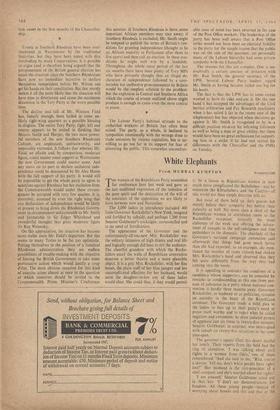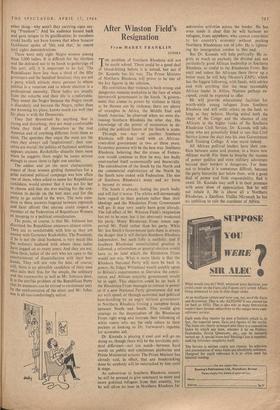White Elephants
From MURRAY KEN1PTON WASHINGTON TrrtiE women of the Republican Party assembled for conference here last week and gave us the last undiluted expression of the isolation of the pure spirit and the desiccation of the will of the amateurs of the opposition we are likely to have between now and November.
The 3,000 ladies in attendance included 400 from Governor Rockefeller's New York, resigned and fortified by subsidy, and perhaps 1,200 from Senator Goldwater's cockaigne, unreconciled and in no need of fortification.
The appearance of the Governor and the unfortunately-all-too-new Mrs. Rockefeller was the solitary intrusion of high drama and real life and logically enough did least to stir the audience. The cheerful grandeur with which the Rocke- fellers assail the walls of Republican convention deserves a better theatre and a more plausible object. It is a pity Mrs. Rockefeller, with her fine bones, the plain stuff of her blue jumper and her uncomplicated affection for her husband, would seem the daughter-in-law any of these ladies would elect. She could thus, if they would permit it, be a lesson to Republican women in how much more complicated the Bathshebas—and by extension the Khrushehevs and the Castros—of this world are than simple doctrine tells us.
But most of them held up their guards not merely before their sympathy but before their curiosity as well. No more than a third of the Republican women in attendance came to the Rockefeller reception, naturally the most elaborate of the, week and offering the induce- ment of canapds to the self-indulgence and free potholders to the domestic. The chairlady of the Governor's national campaign 'committee said afterwards that things had gone much better than she had expected; as an example, she men- tioned the number of times visitors had shaken Mrs. Rockefeller's hand and observed that they felt quite differently from the ,way they had coming into the room.
It is appalling to consider the condition of a candidacy whose supporters can be consoled by remarks so condescending as this one from per- sons of substance in a' party whose national con- vention is hardly three months away. Governor Rockefeller, as husband or as politician, remains an outsider in the heart of the Republican covenant. The Governor made a bold plea to the ladies to face up to their party's need to prove itself worthy and to reject what he called negatism and extremism; he drew isolated patters of applause just six times in twenty-five minutes; Senator Goldwater, in contrast, was interrupted with tumult on twenty-five occasions in the same time-span.
The governor's agents tilled this desert dutiful but lonely. Their reports from the field had the ring of alienation. 'I was talking about civil rights to a woman from Ohio,' one of them remembered. 'And she said to me, "Rita, you're a lawyer. Tell me, don't white people have rights too?" Her husband is the vice-president of a steel company and she's worried about her rights.'
'I am amazed,' Senator Goldwater cried out in that key. 'I don't, see demonstrations for freedom. All these young people—instead of worrying about bombs and this and that or the other thing--why aren't they carrying signs say- ing "Freedom".' And his audience leaned back and gave tongue to its gratification; its members could hardly not have known that when Senator Goldwater spoke of 'this and that,' he meant civil rights demonstrations.
There were only eight Negro women among these 3,000 ladies. It is difficult for the shirtless and the defeated not to be harsh to gatherings of this sort; still, it is important to be fair. The Republicans have less than a third of the fifty governors and the hundred Senators; they are not a party which attracts many persons to whom politics is a vocation and to whom election is a professional necessity. These ladies are usually from the suburbs and their life is comfortable. They resent the Negro because the Negro revolt is disorderly and because the Negro, rather than not knowing his place, knows much too well that his place is with the Democrats.
They feel threatened by anything that is young and disturbing; they are most comfortable when they think of themselves as the real America and of anything different from them as alien. The speeches they enjoy the most are the ones they always call `inspirational'; their con- cerns are moral; the politics of factional ambition appears unclean. Rockefeller disturbs them most when he suggests there might be issues serious enough to cause them to fight one another.
The oddest and yet the most characteristic aspect of these women girding themselves for a great national political campaign was how often one of them, when asked to name her Republican candidate, would answer that it was not for her to choose and that she was waiting for the con- vention to decide on the best man and for the Party to go united to the wars. The note com- mon to these answers -lingered between reproach and faint affront that anyone could suspect a member of the Federation of Republican Women. of stooping to apolitical consideration.
The point, of course, is that Mr. Johnson has disarmed the Republican amateurs almost entire. They are as comfortable with him as they are uneasy with Governor Rockefeller. The President, if he is not the ideal husband, is very much like the ordinary husband with whom these ladies have jogged on so many years. And they are not, bless them, ladies of the sort who are open to the entertainment of dissatisfaction with their hus- bands. They will not vote for him, of course; still, there is no plausible candidate of their own who suits their bias for the simple, the ordinary and the trustworthy as well as Mr. Johnson does. It is the terrible problem of the Republican Party that its amateurs can bestirred to excitement only by the confrontation of the alien; and Mr. John- son is all-too-comfortingly native.



































 Previous page
Previous page